Vallis, Albert
Van Asch, Elsie
Vannini, Antonio
Varnham, Milton Rhodes
Varty, John
Vine, Alfred Walter Victor
von Lubbe, Francis Louis Carl
Watkins, Laurence
Webbe, William Henry
Webley, William, William Usher and Thomas Usher
Webley & Sons/Webley, Sons & Gofton
Webster, Thomas
Wells, Henry
Weniger, Adolphe
Werner, Louis
West, George Richard
West, William Hautrie
White, Emilia
White, Thomas
Whitehorne, Allen
Whitelaw, Edith
Whitwell-Butler, Thomas
Whyte, Vergne, see Stebbing, W. Horace
Willeby, Charles
Williams, Bryant
Williams, Robertson Bradford
Williamson, James
Willis Archibald Dudingston
Willmette, William Frederick
Willson, Ellen
Wilson, Annette
Wolf, Sidney
Woods, Hampton see Tidman, Harold Woods
Woods, John Joseph
Wright, Ethel
Wylie, William Galbraith
Young, Mary Catherine Philomena (Katie)
Zettwitz, William Frederick
Vallis, Albert
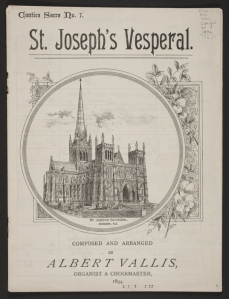
Organist, choirmaster, conductor
Born: 1862, England
Died: 1932, Dunedin
Active in New Zealand: 1887-1932
The reasons for Vallis’ migration is not known but on his arrival he took the position of organist and choirmaster at the Congregational Church in Dunedin. From there he moved to St Matthew’s Church and finally to his most important position at St Joseph’s Catholic Cathedral. He was also the official pianist and organist to the New Zealand and South Seas Exhibition, held in Dunedin from 1889 to 1890, a successful music teacher, musical director of the St Cecilia Society and foundation member of the Otago Society of Organists.
He composed a number of works, both for services and also for secular performances.
Compositions
Sacred Heart Benediction service (Dunedin: St Joseph’s Cathedral. 1893)
St Joseph’s Vesperal. (Dunedin: St Joseph’s Cathedral, 1894)
Missa pro defunctis, for Bishop Moran (Dunedin: St Joseph’s Cathedral, 1895)
Mother England. (Otago Daily Times, June 30, 1898)
Most sacred heart (Dunedin: St Joseph’s Cathedral, 1905?)
Resources
Murray, D. Albert Vallis, 1862-1932. (Cemeteries database)
EN
************************
Van Asch, Elsie
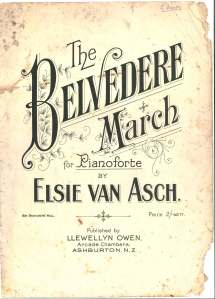
Composer
Born: 1872, Christchurch
Died: 1951
The duaghter of pioneer educator for the deaf, Gerrit Van Asch, Elsie was educated at Christchurch Girls High School and lived for much of her life in Sumner. She was an active sportswoman and composed a small number of pieces, two of which were published locally. She later married J. Edward Stevens, a teacher at the school for the deaf.
Compositions
Belvedere march. (Ashburton: Owen, 1903)
Clio waltz. (Ashburton: Owen, 1907)
The Dream song. (Unpublished, 19–?)
EN
*********************
Vannini, Antonio Damiano
Music teacher, dancing teacher, composer
Born: 1856,
Died: 1925
Active in New Zealand: 1878 – 1925
Of Swiss Italian heritage Vannini had studied music in London and Paris. After a period living in Mosgiel on his arrival in New Zealand, Vannini relocated to Blenheim where he remained for the rest of his life. One of his pieces, the Picton Schottisch, has remained in the Scottish Country Dancing repertoire.
Compositions
True love. (Dunedin: ?, 1885)
Lyttleton galop. (1885)
Hortensia Hoortefooselum (Unpublished comic opera staged in Mosgiel, 1888)
Il Gottardo valse (London: Chappell, 1883, and, Dunedin: Dresden, 1889)
Picton schottisch. (London: Chappell, 1883, and, Dunedin: Dresden, 1889)
Wild girl mazurka. (London: Chappell, 1883, and, Dunedin: Dresden, 1889)
Blenheim waltz. (London: Davison, 1894)
Sunnybourne waltz. (London: Davison, 1894)
Petite serenade. (Chicago: Summy, 1902)
The Niagra waltz. (Unpublished, 1906)
Poor lonely heart. (Boston: Boston Music Co., 1908)
Quartley’s 1st musical album. (Blenheim: Quartley, 1913) – contains several pieces by Vannini.
EN
************************
Varnham, Milton Rhodes
Architect, musician, band leader, music retailer, composer, cornet player
Born: 1860, Wellington
Died: 1938, Levin
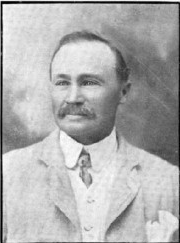
Milton Varnham trained as an architect in Wellington and then moved to the Wairarapa, where he was responsible for the design of a number of civic buildings including the Masteron Coronation Hall and Carterton Band Rotunda. In 1891 he opened a music warehouse in Greytown and acted as an agent for George Reichardt. He also taught the violin, clarinet, cornet and double bass. He was bandmaster of the Greytown Brass Band, choir master of the Church of England choir, conductor of the operatic society and conductor of the Levin Orchestra Society.
Compositions
Merry dancers’ mazurka. (Wellington: 1893)
Lady Mayor Polka (Unpublished, 1894)
Arbor day cantata. (Unpublished, 1892)
Resources
Cyclopedia of New Zealand, Taranaki, Hawkes Bay and Wellington Provincial Districts, p. 736 (photo credit)
CG
*******************
Varty, John
Publisher, music retailer
Born: 1832, United Kingdom
Died: 1882, 22 August, Adelaide, Australia
Active in New Zealand: 1858-1868
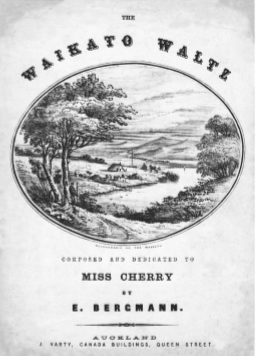
Arriving on the ‘Mariner’ in 1858, Varty set up his own bookselling and general goods business in the Canada Building, Queen St, Auckland in 1860. He soon expanded his business to include lithographic and letterpress printing. In 1862 he published and sold the earliest known music notation publications in New Zealand. These were two pieces by a bandmaster of the British Regiments in Auckland, Louis Werner’s Southern Beauties Schottische and Fairy Bells Polka Mazurka. Over the next few years these were followed by Bergmann’s Waikato Waltz, and Neuzerling’s Light Brigade Polka.
Varty’s business failed after his arrest for bankruptcy. His presses were sold and after his release he found employment working for the government service. In 1868 he left New Zealand and settled in Adelaide, South Australia where he does not appear to have had any involvement with music printing or publishing.
Resources
Nichol, E. “Bookseller, circulating library owner, printer, publisher, agent, raconteur, freemason, volunteer soldier and cricket enthusiast—John Varty’s Auckland career, 1858–1868.” Script & Print: Bulletin of the Bibliographical Society of Australia and New Zealand, (2014), 38 (4), pp. 212-228.
EN
********************
Vine, Alfred Walter Victor
Organist, music teacher, choir leader, composer
Born: 1876, Pimlico, England
Died: 1947, Timaru
Active in New Zealand: 1910-1947
Alfred Vine was a well qualified organist having attained his FRCO and LRAM and was organist at Tewkesbury Abbey before migrating to New Zealand. He performed the organ part in the Wellington Musical Union’s concert of Bach’s St Matthews Passion, which was advertised as the first performance of the work in New Zealand. Then settling in Timaru he worked as a music teacher and fulfilling the role of organist at St Mary’s Church for over 35 years. He was also conductor of the Timaru Orpheus Choir, local Secretary for Trinity College, President of the Society of Musicians of Timaru, musical director and accompanist for numerous concerts, Vice-President of the New Zealand Church Music Society, and music teacher at both Timaru Boys and Timaru Girls High School.
Vine had composed several short works before coming to New Zealand and added to his works. One piece, God of our homeland, was performed at the 1918 Christchurch Festival of New Zealand Music, and another was performed by pupils of Timaru Boys High School during the visit of the Duke and Duchess of York.
Compositions
A thought at twilight. (London: Carlton, Saville & Co., 1899)
After the war. (London: J. B. Cramer, 1902)
The Gift of Heaven. (London: Romer & Hutchings, 1904)
God of our homeland: New Zealand anthem. (Timaru: Bristol Piano, 1918)
[Father omnipotent]. (Unpublished, 1927)
EN
**********************
von Lubbe, Francis Louis Carl
Music retailer, pianist, piano tuner, composer, teacher
Born: 1886
Died:
Active in New Zealand: c1905-c1913
Born in Germany and came to New Zealand sometime before 1905 where he taught music in Gisborne. In 1907 he was convicted of theft and imprisoned. In 1910 he was working for the British and Continental Piano Co. in Auckland and in 1911 moved to New Plymouth with the company. He subsequently left their employ and worked as a piano tuner and opened a piano warehouse. In this capacity he as agent for F. J. Pinny of Wellington. Around 1913 he appears to have abandoned his family and moved to Australia.
Compositions
Spring morning waltz. (New Plymouth: Hooker, 1911)
CG
********************
Watkins, Laurence
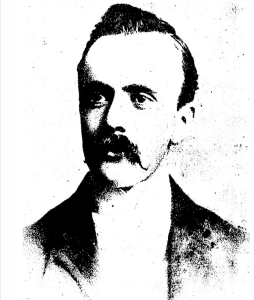
Organist, music teacher, composer, music adjudicator
Born: 1864, Akaroa
Died: 1941, Wellington
Laurence Watkins, along with Alice Rowley were the first students to graduate (in 1900) with a Bachelor of Music from the University of New Zealand (Canterbury University College). Organist at St John’s, Latimer Square and assistant organist at Christchurch Cathedral. Appointed as organist to St Mark’s Wellington in 1896, he remained there until 1939. His compositions included service pieces, works for organ and a number of songs. He was also conductor of the Liederkranz and numerous other groups. He was also a member of the Wellington Society of Profesional Musicians, acting as Vice-President and President.
Compositions
Story of the cross. (Unpubished)
For this great reign. Anthem. (Unpublished, 1897)
For their Queen and Union Jack. (Wellington: Dresden, 1900)
Barcarole. (London: Frederick Harris, 1909)
Triumph, for organ. (Unpublished, 1909)
Nocturne. (Unpublished, 1910)
The tournament. (Unpublished MS at National Library of NZ, 1911)
The Gift. (Unpublished, 1912)
Toy symphony (in collaboration with Maughan Barnett and Horace Hunt). (Unpublished, 1912)
Happy songs for happy children. (Melbourne: Allan, 1922)
Songs of the seasons. (Melbourne: Allan, 1922)
Our nation and name. In: Rotary Song Book (?, 1924)
St Mark’s School song. (Wellington: 1925)
The King shall rejoice. Anthem. (Unpublished, 1935)
Romance in d flat (Unpublished, 1935)
EN
********************
Webbe, William Henry
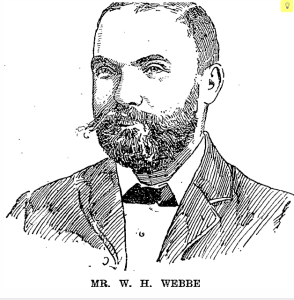
Observer, 17 June 1893, p4
Music teacher, music retailer, pianist, composer, writer
Born: 1856, London
Died: 1921, Auckland
Active in New Zealand: 1883-1921
Webbe’s first retail experience in Auckland was running the music section of the importer of sewing machines, bicycles and pianos, W. C. Dennes. At the same time he established his teaching studio, teaching piano, organ, theory and singing, with the first of his annual student’s concerts being held in 1885. During this time a number of his compositions, primarily for the piano or songs were published and widely advertised.
He then became agent and later manager of the Berlin (later London and Berlin) Piano Importing Company, and as an incentive to purchase, copies of his works were given to purchasers of new pianos. In time he ceased to act as a music retailer, concentrating on his teaching activities and running the Auckland School of Music which had a number of teachers associated with it, including Margaret Spooner, Guillaume Paque, and later his daughter Madeleine Wilcox. He entered students into both of the English music examinations systems, with his students having considerable success, and regular student recitals were a feature of the school’s teaching practice. Continuing his interest from his early days in England, Webbe also wrote a number of articles on music for local newspapers including the Evening Telephone, and was President of the Auckland Society of Professional Musicians.
A contemporary description of the School of Music not only mentions the number and variety of pianos available, but the fact that he had a music library consisting of over 6000 scores and music literature. His teaching and recitals made much use of arrangements of larger works for 2 and 3 pianos.
In addition to his compositions, Webbe wrote two works on music teaching. The Pianist’s ABC was published in London and was well received by the contemporary press.
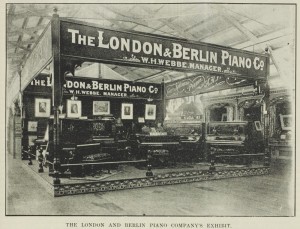
Auckland Libraries Heritage Collections NZG-18990128-105-1
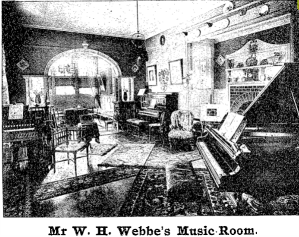
Observer, 10 September 1898, p17
Compositions and other writings:
My love, I love thee best. (Auckland: Webbe, 1885)
Bell Polka. (Auckland: Berlin Piano, 1886)
Old folks at home. (Auckland: Berlin Piano, 1886)
Supplication. (Auckland: Berlin Piano, 1886)
Trust in me . (Auckland: Berlin Piano, 1886)
Madoleine. Song with pianoforte and violin and cello accompaniment. (Auckland: 1886)
Jottings. Part 1 Pianoforte playing . (Auckland: A. Eady, 1893)
Pianist’s ABC Primer. (London: Forsyth, 1900)
Resources:
Alexander Turnbull Library. Wilcox, Madoleine 1887?-1981? : Papers relating to the Webbe School of Music MS-Papers-9772
‘Mr W. H. Webbe’. Observer, 7 March, 1885, p. 9.
‘An Auckland Music School’. Observer, 3 September, 1898, p. 18.
EN
*********************
Webley, William, Thomas Usher and William Usher
Music retailers
Born: 1846 (William); 1876, New Zealand (William Usher); 1878, New Zealand (Thomas Usher)
Died: 1937 (William); 1952 (William Usher); 1943 (Thomas Usher)
Active in New Zealand:
William (Snr) was a tuner and repairer of all types of musical instruments in Wellington in 1880 and by 1882 was operating a music warehouse in the city. In 1883 he moved to Christchurch and set up in business there. His sons William Usher and Thomas Usher were also piano tuners and worked with him in the business which then became Webley & Sons.
CG
********************
Webley & Sons/Webley, Sons & Gofton
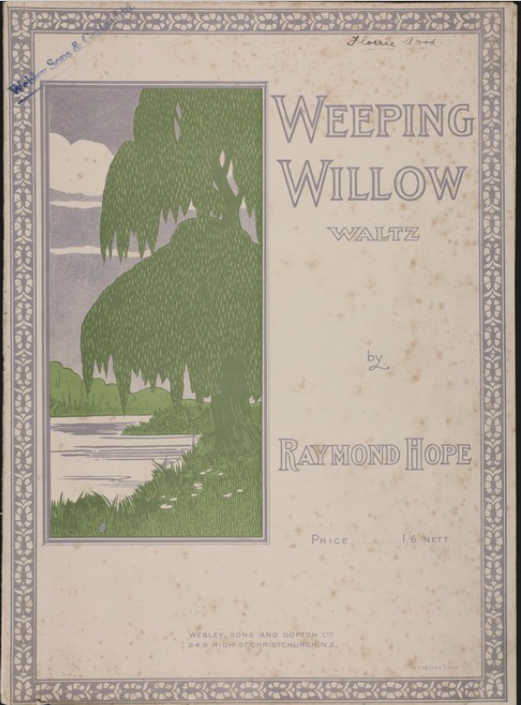
Location: Christchurch
Established: 1883
Ceased business: 1940
Originally established by piano tuner and seller William Webley in 1883, the business first advertised as Webley & Sons in 1897 and included William (Snr)’s sons, William Usher and Thomas Usher, also piano tuners. In 1902 another piano tuner, John Gofton, was brought into the partnership. In 1914 the partnership took over the Chivers business in Christchurch. Around this time they published two pieces of sheet music – Raymond Hope’s Weeping Willow Waltz and The New Zealand Marsellaise by Rouget d’Isle. A branch of Webley, Sons & Gofton was opened in Greymouth in 1915 and and another in Dunedin in 1920. In 1940 the business was sold to Begg’s.
CG
********************
Webster, Thomas Samuel
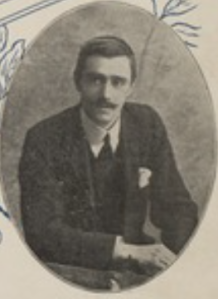
Music retailer, music teacher, pinao tuner, composer
Born: 1884, England
Died: 1956, Hamilton
Active in New Zealand: 1909 – 1956
The owner of music stores in Hamilton, Stevens and Webster from 1915 and Webster’s Music Store from 1916, Webster was also a composer and two of his marches achieved some popularity with military bands. He was also organist in Morpeth, England before his migration and continued with appointments at Huntly Methodist Church, the Hamilton Weslyan Church and St Paul’s Methodist church. He led various choirs including the Hamilton Choral Society.
An arrangement of the March Waikato has been made by John Wells.
Compositions
March Waikato, (London: Hawkes, 1908) – also referred to as the Waikato March.
Olympia march. (Melbourne: Harris, 1916)
New Zealand: a national song. (Hamilton: Webster’s, 1919)
Recordings
March Waikato, arranged for organ. John Wells. From the land of the long white cloud. 1991
EN
********************
Wells, Henry
Organist, conductor, music teacher
Born: 1852, Worcester, England
Died: 1918, Christchurch?
Active in New Zealand: 1879-1918
Henry Wells arrived in New Zealand to take on the position of organist at St Michael’s Church, Christchurch. He was also for a period organist at Christchurch Cathedral, Durham St Methodist Church, Taranaki St Weslyan Church Wellington, St Matthew’s Masterton, and briefly on the staff of the Nelson School of Music. While in Christchurch he established a Motett Choir, performed solo recitals at the Christchurch Exhibition in 1906 and conducted a performance of Mendelssohn’s Elijah for the Exhibition programme. He was a frequent recitalist at a number of churches, mostly in the South Island.
Resource
Cyclopedia of New Zealand, Canterbury Provincial Districts, p. 202
EN
**********************
Weniger, Adolphe Jean
Furrier, composer
Born: 1861?
Died: 1940, Wellington
Active in New Zealand: 1886 – 1940
Weniger operated his fur shop in Wellington but also produced a number of short pieces, mostly for the piano. Some were also performed by local orchestras, such as the King’s Theatre Orchestra, Wellington and at the Fuller’s Pictures.
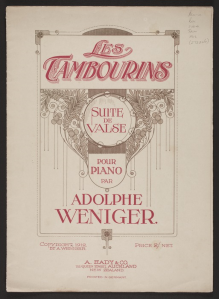
Compositions
Doux Amour gavotte. (London: Reeder & Walch, 1897)
Petit oiseau. (Whanganui: O’Hara, 1911)
Belle etoile. (1912)
Castanetas (1912)
Bouton d’innocence (Wellington: Begg’s, 1912)
Coeur d’amour. (1912)
Fleur et jeunesse. (1912?)
Petite perle. (1912)
Les tambourin: suite de valse. (Auckland: A. Eady, 1912)
EN
*********************
Werner, Louis
Bandmaster, clarinetist, cellist, piano retailer
Born: 1826, Germany
Died: 1881, Netley, England
Active in New Zealand: 1860-1863
Bandmaster for the 14th Regiment, Louis Werner ensured that the band was involved in a range of local musical activities as well as military functions. His two local music publications were amongst the earliest pieces of sheet music in musical notation printed in New Zealand. He also sold pianos from Parnell, returning to England in 1863 and remaining with the Regiment for some years.
Compositions
The Fairy Bells: schottiche, arr . (Auckland: Varty, 1862)
Southern Beauties: schottiche. (Auckland: Varty, 1862)
A Day in the Camp at Otahuhu: fantasia. Auckland: Unpublished, 1862)
EN
*********************
West, George Richard
Conductor, music teacher, composer, music retailer
Born: 1839, England
Died: 1891, New Zealand
Active in New Zealand: c1860-1891
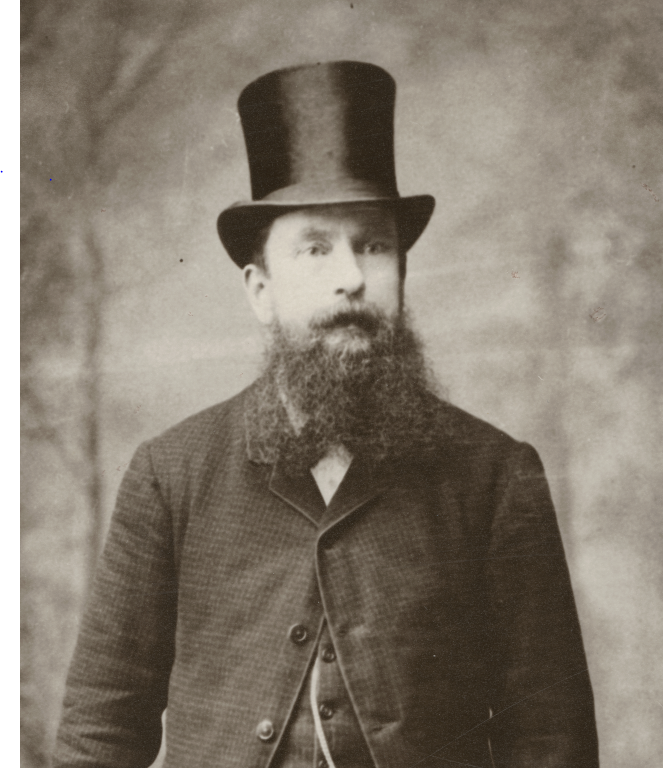
George West was born in England and educated as a chorister. After arrival in New Zealand he became an important figure in Dunedin’s musical circles. He was conductor of the St Pauls’ choir, arranged musical programmes for Masonic ceremonies and in 1863 formed the Dunedin Philharmonic Society. This amalgamated with the Dunedin Choral Society a year later and he then conducted the joint choir. In 1865 he was heavily involved in the musical programme for the the New Zealand Exhibition held in Dunedin in 1865.
In 1861 he established Dunedin’s first music retail business and over the next twenty-five years published at least 12 local compositions, including one of his own. He also published three issues of the New Zealand Musical Magazine. His daughter Jeannie Macandrew trained overseas and became a well known musician on her return to New Zealand.
Compositions
Colonial mazurka (Dunedin: G R West, 1882)
The new flag (Dunedin: G R West, 1885)
The Old Flag (Dunedin: G R West, 1885)
Other resources:
Nichol, E. Dedicated to the colonial music-loving public, pp 188-189
CG
*******************
West, William Hautrie
Organist, choirmaster, conductor, teacher, music retailer, composer
Born: 1844, England
Died: 1925, Australia
Active in New Zealand: 1873-1890
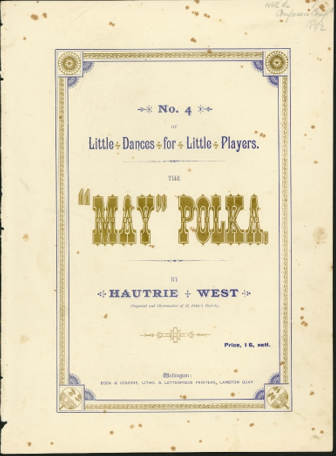
The brother of George West, Hautrie West was organist and choirmaster of the Royal Military College at Sandhurst before arriving in Invercargill in 1873 to take up the position of organist at St John’s Church. As well as undertaking this role he also taught organ, piano, harmonium, violin and singing, conducted the Philharmonic Society, the Invercargill Orchestral Society, and the Wesleyan Church choir and was master of the Invercargill Volunteer Brass Band. In 1874 he opened a Pianoforte, Harmonium and Music Warehouse on the corner of Esk and Kelvin Streets where he sold a range of instruments and music. In 1878 his premises were moved to Dee Street. In 1881 he sold his stock and moved to Wellington where he was organist of St Peter’s Church and taught music. In 1890 he left New Zealand for Ballarat.
Composition
“May” Polka No 4 Little Dances for Little Players (Wellington: Bock & Cousins, 1890)
CG
********************
White, Emilia Arrietta Albertini (nee Arnati), later Ancell
Singing and music teacher, singer
Born: 1832, England
Died: 1915, Wellington
Active in New Zealand: 1863-1915
Arriving in Dunedin from the Victorian goldfields, Mrs T. White set up as a teacher of singing, piano and guitar. Wife of the piano teacher, tuner and repairer Thomas White, she contributed significantly to the family income. She was appointed music and singing teacher at Otago Girls High School where she taught for approximately 20 years. After White;s death in 1889 she continued teaching until she married Mr Ancell and moved to Wellington. She continued to perform as a singer and also taught, but to a much smaller degree than during her time in Dunedin.
EN
*********************
White, Thomas
Piano teacher, piano tuner and repairer, pianist, composer
Born: 1830, Manchester
Died: 1889, Dunedin
Active in New Zealand: 1863 – 1889
With his wife Emilia, Thomas White had moved from England to the Australian goldfields. They then moved to Dunedin and he also travelled around the area, offering his services as a pinao tuner and repairer. He taught music, performed in a number of concerts, including at the New Zealand Exhibition in Dunedin in 1865, where he played the piano which was part of George West’s display.
Compositions
Fern Hill polka. (Dunedin: George West, 1866?)
Welcome. (Dunedin: George West, 1869)
Resources:
Godfrey, L. “White, Thomas.” The Northern Cemetery: Dunedin’s buried history. Website. http://www.northerncemetery.org.nz/burial/5448/bio
EN
**********************
Whitehorne, Allen Anderson
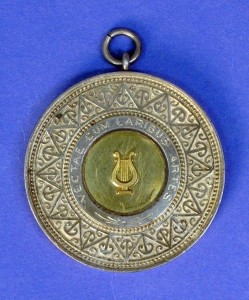
Medal for Part-song
Auckland Museum
Civil engineer, composer
Born: 1842, Scotland
Died: 193-?, Paraguay?
Active in New Zealand: 1878-1888
Allen Whitehorne had a life filled with change. He was born in Scotland, spent his childhood in Jamaica. was educated in England. He trained as a civil engineer and worked for a short time in British Guiana before returning to England. He migrated to New Zealand in 1878 where he established his business. Music clearly was an abiding personal interest, and he successfully entered the Auckland Society of Arts music competitions held in 1884-1886, winning first prize medals in 1885 and 1886.
For seemingly personal reasons he moved to Sydney and shortly after to Queensland. His wife, from whom he had separated, was killed in 1889. Whitehorne then joined the Nova Australia movement and sailed for Paraguay in 1893 where he appears to have remained. His Auckland Society of Arts 1886 medal was returned to Auckland in 1938.
Compositions
Come, Stella, come. In: New Zealand Farmer, Bee and Poultry Journal, May 1885
The Prize waltz. (Auckland: Brett, 1885)
Hurry Scurry Polka. (Auckland: Star, 1886)
Hurry Scurry Polka. In: Music Magazine Christmas Supplement 1886.
The splendour falls on castle walls. Unpublished, 1886
EN
********************
Whitelaw, Edith
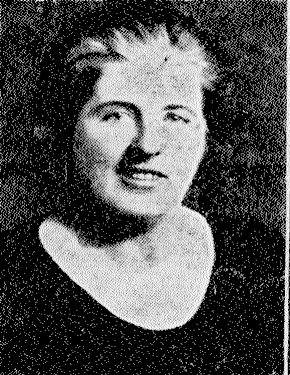
Violinist, violin teacher
Born: 1881, Auckland
Died: 1963, Auckland
Edith Whitelaw learnt music as a child from Samuel Adams, performing solos from the age of 10 and leading the orchestra of pupils at age 11. She went on to study at the Royal College of Music in London. Awarded an Exhibition in 1902 she returned to New Zealand and was appointed as leader of the Second violins in the orchestra for the 1903 Wellington Music Festival. Returning to Auckland where she took on the position of Leader of the Auckland Orchestral Society orchestra, and later the Auckland Choral Society orchestra and the Bohemian Orchestra. She taught violin to private pupils and lived in Remuera, where she was joined by her sister the noted educationalist and first Headmistress of the Auckland Girls Grammar School, Annie.
EN
**********************
Whitwell-Butler, Thomas
Music teacher, composer
Born: 1861, Ireland
Died: 1915, Lost at sea
Active in New Zealand: 1892 – 1895
Thomas Whitwell-Butler was an Irish organist and music teacher who visited New Zealand for a period of approximately three years. This time was mostly spent in Dunedin where he had family, but he also spent some time living and working in Greymouth. As well as teaching he both sang in and conducted choirs. After his return to Ireland his Irish-language opera Muirgheis was produced in Dublin. He died in the sinking of the Lusitania in 1915.
See also the story on our “Features” page for 14 October, 2019.
New Zealand published compositions:
Fate’s decree. (Dunedin: Wilkie, 1892?)
Benediction, for St Joseph’s Cathedral. (Dunedin: St Joseph’s, 1893?)
Other resources:
Harrington, E. Lost at Sea: Thomas O’Brien Butler and RMS Lusitania (http://blogs.ucc.ie/wordpress/theriverside/2015/05/20/lost-at-sea-thomas-butler-obrien-and-rms-lusitania/)
EN
*********************
Williams, Bryant
Composer, bassoon player
Born: 18-?, England?
Died: pre-1933, ?
Active in New Zealand: 1917-1921
Bryant Williams was only active in Dunedin for a few years but during that time he wrote a number of compositions for Dunedin musical groups including the Dunedin Male Voice Choir and the Dunedin Choral Society. He was reported to have been a student at the Royal Academy of Music, London and was a bassoon player. One of his orchestral pieces, Young Belgium, was performed at the 3 August 1918 Christchurch Festival for New Zealand Music.
Compositions
A Cuckoo Madrigal. (Unpublished, 1917)
Young Belgium: march prelude for orchestra. (Unpublished, 1918)
A Hymn of Praise. (Dunedin: Charles Begg, 1919)
La Jeunne Belgique: two preludes for piano. (Dunedin: Bristol Piano, 1919)
Song of goodwill: thanksgiving anthem. (Unpublished, 1919?)
EN
**********************
Williams, Robertson Bradford
Tenor singer, choirmaster, lawyer
Born: 1861, Augusta, Georgia, USA
Died: 1942, Otaki
Active in New Zealand: 1886-1942
Robert Bradford was another of the Fisk Jubilee Singers who decided to settle in New Zealand. Having started his law studies at Yale, he completed his studies and was admitted to the New Zealand bar in 1889. He became well-known in Wellington law circles and was also involved in local politics, becoming Mayor of the Onslow Borough in 1902. He was choirmaster at the Wesleyan Church in Taranaki St and sang with the Wellington Harmonic Society.
Resources
Bourke, Chris. “R. B. Williams. He came, he sang, he stayed.” Music in New Zealand, Autumn 1991, p48-51
Hart, Philip. Black Americans and Te Aroha Mining. (Hamilton: University of Waikato, 2017). Te Aroha Mining District Working Papers, No. 131, p8-14.
Wellington City Libraries. Robert Bradford Williams: an oral history: The African-American Mayor of the Wellington Borough of Onslow. https://www.wcl.govt.nz/heritage/robertbradfordwilliams.html
EN
*******************
Williamson, James
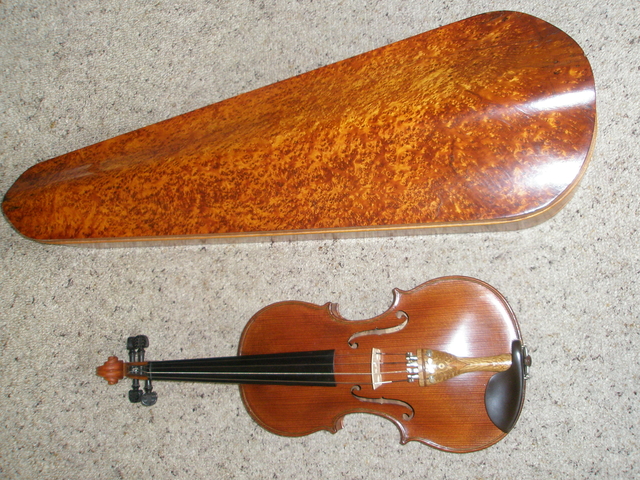
Cabinet maker, violin maker
Born: 1854, Shetland Islands, Scotland
Died: 1942, Wellington
Active in New Zealand: 1874-1942
James Williamson lived in Hawkes Bay and Fielding before moving to Wellington and working for some time with the Post and Telegraph Department. His skill as a craftsman woodworker was recognised and he produced a number of ceremonial pieces for the government. His violin-making became his main activity after his retirement and his instruments, many of which used native timbers, were recognised internationally for their quality.
Resources
Alexander Turnbull Library. Archive of New Zealand Music. Williamson, James, 1854-1942: Papers. MS-Group-0637
Photo source
Violin and case., 1928, New Zealand, by James Williamson. Purchased 2014. CC BY-NC-ND 4.0. Te Papa (GH024251)
EN
*********************
Willeby Hawthorne, Charles
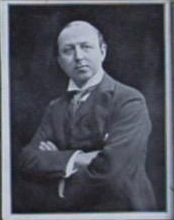
Music critic and writer, composer, accompanist, music teacher
Born: 1865, England
Died: 1955, England
Active in New Zealand:
It is arguable whether Charles Willeby, or Willeby Hawthorne, belongs in a resource dedicated to New Zealand music. However, although English-born and living most of his adult life in England, Charles Willeby had a New Zealand connection and started his musical career while a young man in New Zealand.
He arrived in New Zealand with his mother and step-father (Stuart Hawthorne) in 1871. Tragic family circumstances lead to a return to England and then back to New Zealand where he took up a position with the New Zealand government service in Wellington. His passion however was music and he performed at a number of concerts. After a few years and just after his marriage to the singer Mary Hume in 1889, he traveled back to England where he dropped his late step-father’s name and established a career as a writer on musical subjects as well as composing songs. He also published and composed under the name Cuthbert Wynne.
Compositions and books (selected)
Daphne. (Wellington: Lyon & Blair, 1886)
The golden fleece. (Dunedin: Begg’s 1886)
So long ago. (London: Enoch, 1889)
At Even. (London: Lucas, Weber, 1890)
My other self. (London: Lucas, Weber, 1890)
Longing for thee. (London: Lucas, Weber, 1891)
Saionara. (London: Joseph Williams, 1892?)
Masters of English music. (London: Osgood, 1893)
Night fairies. (London: Elkin, 1902)
Album of favourite songs. (London: John Church, 1904)
Mandalay: song. (Cincinatti: John Church, 1911)
EN
********************
Willis, Archibald Dudingston
Printer, bookseller, publisher
Born: 1842, London
Died: 1908, Gisborne
Active in New Zealand: 1857-1908
A. D. Willis travelled to various locations before settling in Whanganui in the 1860s. He set up his own printing works with considerable success and was one of the leading proponents of chromolithography (colour printing) in New Zealand. He published at least six New Zealand music pieces between 1884-1910.
Resources
Johnson, R. “Colour printing in the uttermost part of the sea: a study of the colour print products,
printers, technology and markets in New Zealand 1830-1914” (PhD diss., Victoria University of Wellington,
2002)
Springer, R. ‘Willis, Archibald Dudingston’, Dictionary of New Zealand Biography, first published in 1993. Te Ara – the Encyclopedia of New Zealand, https://teara.govt.nz/en/biographies/2w26/willis-archibald-dudingston (accessed 7 March 2023)
EN
*********************
Willmette, William Frederick
Organ builder and repairer
Born: 1832, Jarrow, England
Died: 1911, Auckland
Active in New Zealand: 187-?-1911
Willmette’s marriage certificate of 1855 gives his profession as a ship builder, and Wises’ 1883 Directory lists him as a carpenter. However, by 1894 the Auckland Star is reporting on work he has done overhauling the organ at Pitt St Wesleyan Church and he worked on a number of instruments after that date.
Resource
Newton, Ronald G. “Organ building in New Zealand 1895-1930.” PhD thesis, University of Canterbury, 1996. Pt. 4, p509-515.
EN
*************************
Willson, Ellen
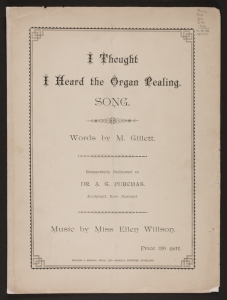
Music teacher, housekeeper
Born: 1836?, England
Died: 1903, Wolverhampton, England
Active in New Zealand: 1865-1897?
Ellen Willson also used the pseudonym “Estelle”. She was a music teacher of Cambridge, and housekeeper to Dr Waddington. She composed a number of songs, a Dead March after the death of Queen Victoria, and a hymn which won an English competition. She also wrote a satirical literary work Chronicles of Cambridge.
Compositions
Fidelite. (Auckland: Eady, 1893)
Only a tiny glove. (Auckland: Auckland Music Warehouse, 1879)
I thought I head the organ pealing. (Auckland: Wilson and Horton, 1894)
EN
*********************
Wilson, Annette Eliza
Music teacher, pianist, composer
Born: 1835, England
Died: 1902, England
Active in New Zealand: 1870s – 1890s
Pseudonyms
Kia Ora
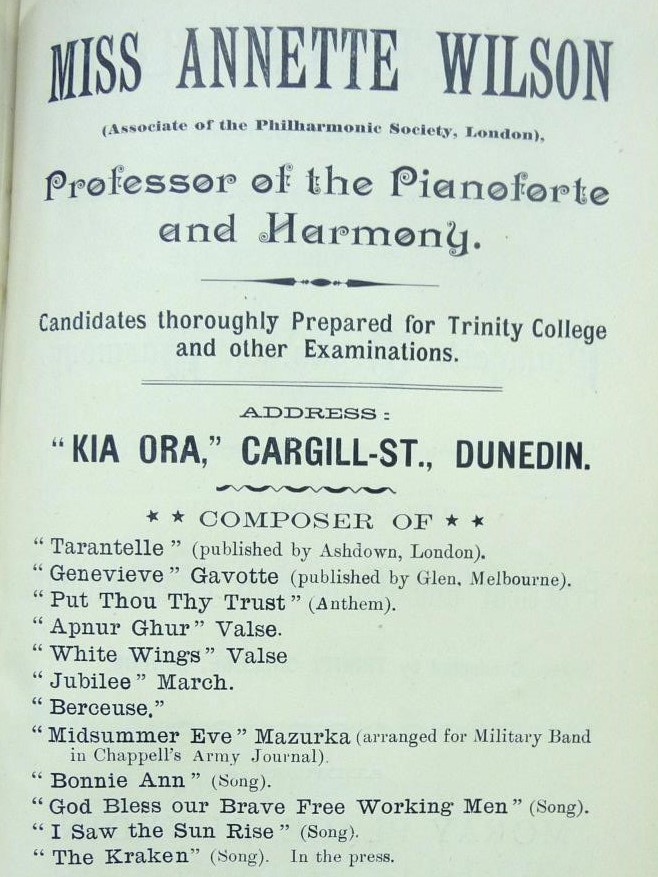
Annette Wilson was in her forties when she emigrated to New Zealand, residing first in Wellington and then for a period of almost twenty years in Dunedin. A cousin, Florian Charles Elliston, had also emigrated and worked at the Customs Department in Wellington.
Wilson’s family was heavily involved in music and the performing arts. Her father, Marmaduke Charles Wilson, was a “Professor of Music” in Westminster, London and her maternal grandparents were Robert Elliston, an actor playwright, singer, and theatrical manager and his wife, who wrote the music for some of his productions. Wilson had been a pupil of Sir Charles Halle and Sir John Goss, and was also an Associate of the Royal Philharmonic Society.
Already a published composer at the time she emigrated, she composed and had published a number of works while earning her livelihood as a piano teacher and performer. When she first arrived she settled in Wellington and acted as accompanist for the Choral Society, but soon moved to Dunedin.
Wilson’s earliest known composition was the March of Triumph published in 1856 but most of her compositions dated from the mid 1870s. She wrote piano works in the popular forms of waltzes, gavottes, mazurkas and marches, songs, choral works and some unpublished instrumental ensembles. Many of her New Zealand works were performed at concerts in Dunedin and in 1895 a concert was presented made up entirely of her works. In addition to her musical compositions she wrote a small (32 pages) book on musical ‘grammar’, drawing on her considerable experience as a piano teacher. In 1892 she also wrote a paper for the Otago Institute entitled Analogy between light and sound : are they convertible? which indicates she may have experienced musical synaesthesia. Wilson travelled back to England on several occasions while living in New Zealand. In 1897 she sold her grand piano (but not her property), indicating that she was planning a longer visit. Her connection with New Zealand remained strong and her song March On made specific reference to New Zealand soldiers in the Boer War.
She died in England in 1902 without returning to New Zealand.
Published compositions:
March of triumph. (London: 1856)
Crocus. (London: 1865)
Reverie for the piano. (London: Lambourn, Cocks, 1874)
I watched the sun rise o’er the sea. (London: Lambourn Cocks, 1876)
Tarantella. (London: Ashdown and Parry, 1877)
O tarry thou the Lord’s leisure. (London: London Music Publishing/Beggs, 1878)
Gavotte and Musette (after Bach) for the piano. (London: 1879)
Village mazurka. (Wellington: Bonnington, 1879)
Bouree. (Dunedin: Kelsey, 1882)
New Zealand jubilee waltz. (Dunedin: Beggs, 1887)
Hinemoa waltzes. (Dunedin: Beggs, 1888)
Apnur Ghur. (Dunedin: Beggs, 1888)
White wings waltz. (Dunedin: Beggs, 1888)
Genevieve Gavotte. (London and Melbourne: Swan, and Glen, 1893) – published under the pseudonym Kia Ora
Midsummer Eve Mazurka. (London: Chappell, 1895)
March on. (London: Weekes, 1902)
Other publications:
“Analogy between light and music – paper to the Otago Institute.” In: Transactions of the Royal Society of NZ, Vol. 25, 1892, p.510-514
First stepping stones in the grammar of music. (Dunedin: Otago Daily Times, 1895)
Other resources:
Nichol, E. Dedicated to the colonial music public, pp. 84-88. https://researchspace.auckland.ac.nz/handle/2292/35499
EN
********************
Wolf, Sidney
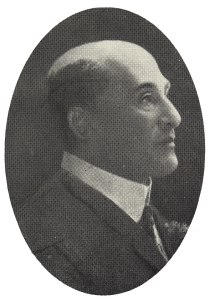
Conductor, music teacher, composer
Born: 1859, London
Died: 1922, Dunedin
Active in New Zealand: 1880 – 1920
Sidney Wolf had an unsettled childhood but eventualy attended the Royal Academy of Music for some tuition. He then began to work as a chorus master and occasional conductor before working his passage to Wellington 1880. After a short time he toured with Cary’s Opera Company, settling in Ashburton and then Timaru, where he conducted the Timaru Choral Society, Timaru Liedertafel, the Garrison and Naval bands. He was also choirmaster at Sacred Heart Church and St Mary’s Anglican Church as well as teaching musical privately and at schools. Over time he also built a reputation as a judge at music competitions. He later moved to Dunedin where he developed his teaching as a singing teacher and choral conductor, leading the Dunedin Choral Society and the Dunedin Operatic Society.
Compositions and writings
Thine. (Unpublished, 1880)
The children’s lament. (Dunedin: Triad, 1896)
Wolf’s music time blocks instruction book. (Dunedin: 1910)
Resources.
Birchell, J. Extracting Mr Wolf’s new Choral Society from its mythological future. City Choir Dunedin website. (Photo source)
Murray, D. Sidney Wolf, 1859-1922. Cemeteries database.
EN
*********************
Woods, John Joseph
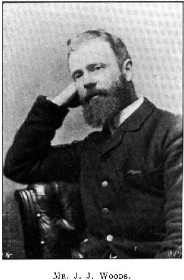
Local government official, composer, violinist, choirmaster
Born: 1849, Tasmania, Australia
Died: 1934, Lawrence, Otago
Woods is most remembered for being the composer of New Zealand’s national anthem. He entered the 1875 competition to set the words of Thomas Bracken’s poem “God Defend New Zealand” and won the prize. He was recorded as being proficient on twelve instruments and active in the musical life of Lawrence as well as many other activities such as tree planting. His wife was also musical, being organist at St Patrick’s for 30 years, and his daughter Mary studied piano in London before becoming a music teacher in Dunedin.
Compositions:
God defend New Zealand. (London: Hopwood and Crew, 1878)
God defend New Zealand. (Lawrence: George Jeffrey, 1884)
March of the Highland Brigade. (Dunedin: Saturday Advertiser, 1885)
Other resources
Cyclopedia of New Zealand : Otago and Southland Provincial District, p. 683 (photo source)
Southern people. (Dunedin: Longacre Press, 1998).
EN
********************
Wright, Ethel Gertrude Elizabeth
Musician, composer
Born: 1881, Auckland?
Died: 1971?
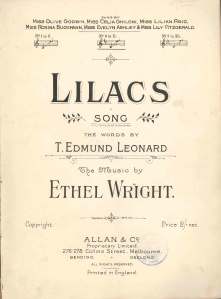
Ethel Wright was educated in Auckland where she learnt the piano from Miss Jessie Adams and passed various Trinity College music exams. She published her first piano work at the age of 21 and continued to write and have published a number of songs even after her marriage to Dr Frederick Reid-Mackay and move to Dannevirke. She was involved with the Dannevirke Operatic Society and contributed to a number of Dannevirke recitals.
Unusually, many of her compositions were published in Australia, although they were distributed in New Zealand as well. After the early death of her husband she appears to have published no further works.
Compositions:
Impish revels. (Melbourne: Glen, 1902)
Mine only mine. (Auckland: Eady, 1902)
By the old style. (Auckland: Eady, 1904)
The city glorious. (Melbourne: Allan, 1906)
Lilacs. (Melbourne: Allan, 1907)
Two songs (Farewell and A Legend). (Sydney: Nicholson, 1912)
When all is still. (Sydney: Nicholson, 1913)
You never could forget. (Sydney: Nicholson, 1914)
Valse Beth. (Sydney: Nicholson, 1917)
Resources:
E. Nichol. “Transplanting traditions”. In: Searches for tradition (Wellington: Victoria University, 2017)
EN
**********************
Wylie, William Galbraith
Lithographer
Born: 1835, Campbelltown, Scotland
Died: 1892, Wellington
Active in New Zealand: 1861-1888
William Wylie first worked in New Zealand with John Varty in Auckland, printing a range of material for him. In 1869 be moved to Nelson where he worked for the Evening Mail Office, and R. Lucas and Sons. While working for Lucas he developed a new music printing lithographic technique combining mechanical and lithographic processes, which was employed in printing Mrs Palmer’s Nelson Exhibition Waltzes.
Wylie returned to Wellington in 1876, worked for a while as a traveller for R. Burrett & Co. and then as a bookseller before returning to work as a lithographer for the Survey Office.
EN
*********************
Young, Mary Catherine Philomena (Katie)
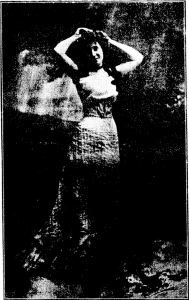
Pianist, music teacher, harpist, organist
Born: 1882, Whanganui
Died: 1936, Los Angeles, USA
Katie Young was one of the frequent performers in Christchurch during the 1890s and 1900s. She studied piano with H. Lund and organ with H. Wells. She was organist at St Mary’s Catholic Church before being appointed in a similar role to the Pro-Cathedral. At the same time she taught music, was accompanist at the Christchurch Music Union, for the Liederkranz and on some occasions for the Liedertafel. She also performed at some of the concerts associated with the Christchurch Exhibition 1906-7, alongside Alfred Hill.
After marrying the actor Winter Hall, they moved to Melbourne where she continued to perform as she did after they then relocated to Hollywood.
EN
*************************
Zettwitz, William Frederick
Violin maker, music retailer
Born: 1868, Hamburg, Germany
Died: 1955, Auckland
Active in New Zealand: 1907-1924
Zettwitz learned his trade in Liverpool where he also produced banjos and other stringed instruments. He migrated with his family in 1907 and estalished a violin shop in Auckland, selling instruments and accessories but focussing on violin making. He returned to England in the mid-1920s but returned to New Zealand in the 1950s. His son, Frederick, re-established the family firm which widened its scope to include guitar making and restoration. Zettwitz’s violins still occasionally appear in auction houses.
Resources
Interview with luthier Mr Zettwitz (Frederick) – Larry Killip. 1951. Podcast
EN
**********************